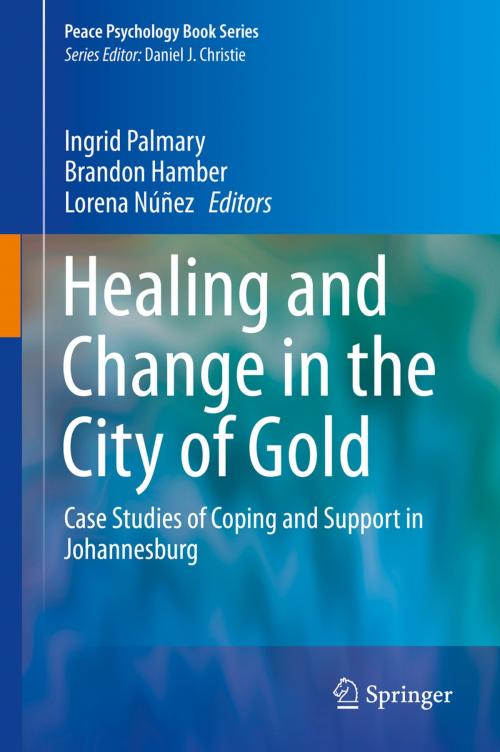Healing and Change in the City of Gold
Case Studies of Coping and Support in Johannesburg
Nonfiction, Health & Well Being, Psychology, Clinical Psychology, Social Psychology| Author: | ISBN: | 9783319087689 | |
| Publisher: | Springer International Publishing | Publication: | October 19, 2014 |
| Imprint: | Springer | Language: | English |
| Author: | |
| ISBN: | 9783319087689 |
| Publisher: | Springer International Publishing |
| Publication: | October 19, 2014 |
| Imprint: | Springer |
| Language: | English |
This volume collects case studies on the lives of people living in post-apartheid Johannesburg, South Africa. In doing so, it considers how people manage, respond to, narrate and/or silence their experiences of past and present violence, multiple insecurities and precarity in contexts where these experiences take on an everyday continuous character. Taking seriously how context shapes the meaning of violence, the forms of response, and the consequences thereof, the contributing chapter authors use participatory and ethnographic techniques to understand people’s everyday responses to the violence and insecurity they face in contemporary Johannesburg. Each case study documents an example of a strategy of coping and healing and reflects on how this strategy shapes the theory and practice of violence prevention and response. The case studies cover a diversity of groups of people in Johannesburg including migrants, refugees, homeless people, sex workers and former soldiers from across the African continent. Read together, the case studies give us new insights into what it means for these residents to seek support, to cope and to heal challenging the boundaries of what psychologists traditionally consider support mechanisms or interventions for those in distress. They develop a notion of healing that sees it as a process and an outcome that is rooted in the world-view of those who live in the city. Alongside the people’s sense of insecurity is an equally strong sense of optimism, care and a striving for change. It is perhaps not surprising, then, that this book deals very centrally with themes of the struggle for progress, mobility (geographic, material and spiritual), and a sense of possibility and change associated with Johannesburg. Ultimately, the volume argues that coping and healing is both a collective and individual achievement as well as an economic, psychological and material phenomenon. Overall this volume challenges the notion that people can and should seek support primarily from professional, medicalized psychological services and rather demonstrates how the particular support needed is shaped by an understanding of the cause of precarity.
This volume collects case studies on the lives of people living in post-apartheid Johannesburg, South Africa. In doing so, it considers how people manage, respond to, narrate and/or silence their experiences of past and present violence, multiple insecurities and precarity in contexts where these experiences take on an everyday continuous character. Taking seriously how context shapes the meaning of violence, the forms of response, and the consequences thereof, the contributing chapter authors use participatory and ethnographic techniques to understand people’s everyday responses to the violence and insecurity they face in contemporary Johannesburg. Each case study documents an example of a strategy of coping and healing and reflects on how this strategy shapes the theory and practice of violence prevention and response. The case studies cover a diversity of groups of people in Johannesburg including migrants, refugees, homeless people, sex workers and former soldiers from across the African continent. Read together, the case studies give us new insights into what it means for these residents to seek support, to cope and to heal challenging the boundaries of what psychologists traditionally consider support mechanisms or interventions for those in distress. They develop a notion of healing that sees it as a process and an outcome that is rooted in the world-view of those who live in the city. Alongside the people’s sense of insecurity is an equally strong sense of optimism, care and a striving for change. It is perhaps not surprising, then, that this book deals very centrally with themes of the struggle for progress, mobility (geographic, material and spiritual), and a sense of possibility and change associated with Johannesburg. Ultimately, the volume argues that coping and healing is both a collective and individual achievement as well as an economic, psychological and material phenomenon. Overall this volume challenges the notion that people can and should seek support primarily from professional, medicalized psychological services and rather demonstrates how the particular support needed is shaped by an understanding of the cause of precarity.















